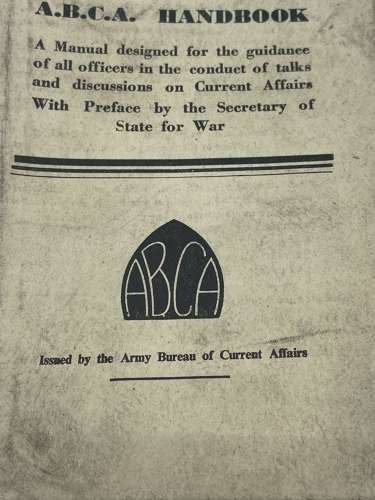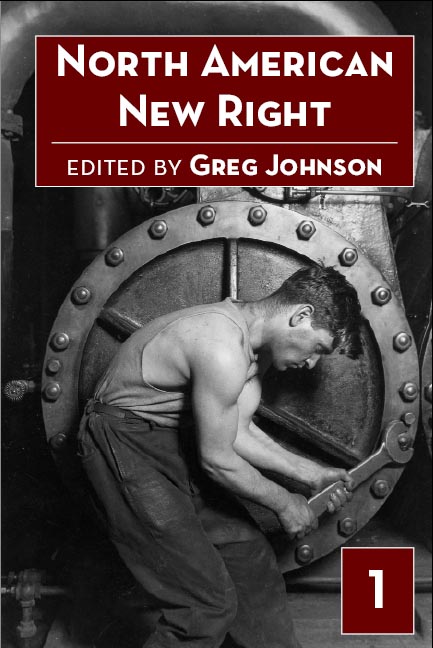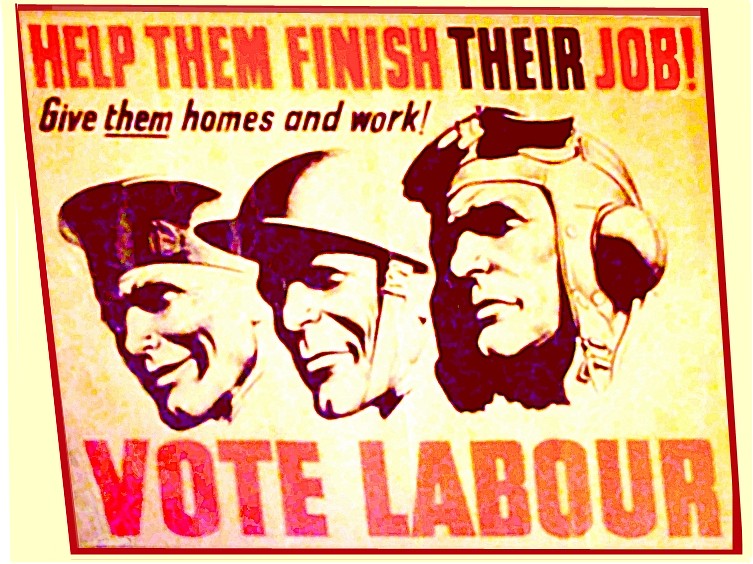Wartime Britain Was Plagued by Fossilized Social Problems
Morris van de CampCorrelli Barnett
The Audit of War: The Illusion and Reality of Britain as a Great Nation
London: Faber and Faber Ltd., 1986
See also: The Collapse of British Power
Hitler knows that he will have to break us in this Island or lose the war. If we can stand up to him, all Europe may be free and the life of the world may move forward into broad, sunlit uplands. — Winston Churchill
This time we can be better prepared if we think now. This is not the time for putting off thinking ‘till we see how things are’ . . . More than that, our plan for a new Britain is not something outside the war or something after the war. It is an essential part of our war aims. It is indeed, our most positive war aim. The new Britain is the country we are fighting for. — Picture Post 4 January 1941
There was a general election in Great Britain in July 1945. Winston Churchill, the defiant British bulldog, and his Conservative Party were ousted. The Conservatives had controlled parliament for a decade and had just won a massive war. Why was there such a political shift?
First, they were in a coalition government with the Labour Party during all that time. Labour’s leader was Clement Atlee, who had been Deputy Prime Minister throughout the conflict. Second, the Labour Party had worked out a political vision as early as 1941, promising to make Britain into a utopia they called “New Jerusalem.”
New Jerusalem turned out to be a failure. Its biggest problem was that it was based on a moralistic worldview that failed to take into account decaying British industry. The policy of New Jerusalem caused the British establishment to make choices that did not allow for a genuine economic recovery following the war and caused British culture to stagnate for decades. Britain won the Second World War in spite of New Jerusalem rather than because of it.
The Metapolitics of New Jerusalem
What the Labour Party meant by New Jerusalem was to apply “Christian socialism” to government policy. This concept originated in the late Victorian period, between 1850 and 1901. Most of Britain’s senior leaders in the 1940s were born right in the middle of this time, so understanding the culture of their youth makes their decisions easier to understand.
The culture of the late Victorian period was shaped by two main thrusts. One was a romantic view of knightly chivalry that was alleged to have existed in the Middle Ages. The other was an interpretation of Christianity developed in the early nineteenth century. These caused the British social and political elite view helping those in need as the greatest moral good. Barnett writes:
. . . [I]n this religious revival, is found the most powerful of all the influences that went to form the character of the British Establishment a hundred years later, and to inspire its progressive members with their faith that justice and love must prevail in human affairs. For the romantic movement expressed itself in Britain above all things through religious emotion: a scorching flame of sin, guilt, salvation and righteousness that forged a mentality which saw the problems of society in moral terms and looked to their solution in the application of Christian principle. (p. 13)
While Barnett’s focus is on British policy, one can easily see that one result of that religious revival was Negro-worship, which helped bring about the American Civil War and the Boer War. It continues on in the mania of whites who supported “civil rights” legislation and, later, Black Lives Matter in the Summer of Floyd.
In the short term, this utopian vision affected British policy at a critical juncture in history: the Second World War. The cause of the war is complex, but the main reason why Britain joined the war, despite finding themselves without allies or much in the way of military capability, was as a result of policy missteps in the decades prior as well as a reckless military guarantee to Poland in 1939. This was a guarantee they were unable to keep, and allowed another nation to draw Britain into its quarrels.
While the war was going on, members of the Labour Party started to put together proposals for a New Jerusalem. They took the metapolitics of Christian socialism as developed by nineteenth-century churchmen and schoolteachers and drew up genuine plans to put this in place. The main plan was outlined in a white paper by Sir William Beveridge that was released in November 1942 that came to be called the Beveridge Report. It called for a comprehensive national insurance scheme, social welfare in various forms, and housing constructio on a large scale.

The idea of a New Jerusalem was promoted by special bulletins to the troops published by the Army Bureau of Current Affairs.
While the Beveridge Report circulated within government circles, Labour Party politicians worked the airwaves. Probably the most serious metapolitical effort was that of the Army Bureau of Current Affairs (ABCA). The ABCA was founded in the autumn of 1941, when Britain was still very much alone during the war. The ABCA issued a magazine to those in the British military which argued that Britain’s war aims should not be to maintain the status quo, but rather to build cities with better houses, create a vast welfare program, and attain full employment.

You can buy North American New Right vol. 1 here.
All of this seemed possible during the war. The government was spending millions of pounds per day on the war effort. British engineers were constructing artificial harbors across the world, often under fire, in order to facilitate military operations, while British industry, especially aviation, was in high gear.
But all of this progress was an illusion. The ABCA’s Current Affairs magazine hinted at this in a between-the-lines and backhanded sort of way. It stated frankly that Japanese railways were better than British ones. They also pointed out that foreign markets for British industry would need to be recaptured after the war. And there were other problems as well. The British government recognized that to obtain aid from the United States, the British would have to sell many of their investments at a loss. This was a trend across the board. British overseas assets were liquidated at fire-sale prices to keep the war going. It was difficult to recover from these setbacks, and New Jerusalem failed to come up with a method to correct the situation.
The Illusion & Reality of Limited Possibilities
While part of the government was dreaming of gleaming new housing developments, those in other branches of government, especially the Board of Trade, were as gloomy and defeatist as the French army had been in 1940. Those on the Board of Trade recognized that British industry had lost out to foreign competition in many areas. Even shoes made in other countries were of better design, quality, and price.
While those with an accurate read on British industry were alarmed, the British media and politicians were creating a myth of wartime brilliance. Why was there such a dichotomy between truth and fiction? According to Barrett:
The paradox can be explained. In the first place, the British war economy existed in an entirely artificial environment subject to none of the harsh stresses of a peacetime climate of competition. Thanks to Lend-Lease and Sterling Area credit, the struggle for export markets had been abandoned. Nor was there any internal competition in the British home market, for all production and distribution was subject to a comprehensive array of government controls, allocations and rationing. . . . British firms producing war supplies under government contract were working on the basis of ‘cost-plus’: that is, their actual production costs with a fixed profit rate added; so there was no spur to efficiency or cost-cutting. Similarly, over-full employment, with employers poaching skilled labour from each other, together with wage levels linked to the cost of living meant that there was little incentive to the workforce to step up productivity . . . (p. 59)
This grim outlook must be compared to that of Germany, which by 1943 was being mercilessly bombed with far more intensity than Britain had been bombed in 1940. The Reich displayed
. . . the professional resourcefulness and steadfastness of German industrial ‘troops’ in expanding production under a bombardment that burned the roofs off their homes and brought the factories down on top of the machines. Again, in making comparisons it has to be recalled that Germany fought her war from first to last out of her own national resources or the resources of countries her army could occupy: the German machine-tool industry equipped German factories; German factories designed and manufactured the Wehrmacht’s excellent equipment; and the Wehrmacht never ran short of munitions until the very end of the war. Britain, however, critically depended on the United States, not only as a basic economic lifeline, but also for huge supplies of equipment both for factories and for the armed forces. (p. 61)

British troops driving American-made Sherman tanks. Barnett says that “[w]ith few exceptions, such as the Matilda, a heavily armoured but slow infantry-cooperation tank, British tanks until late in the war were mechanical abortions that foreshadowed the disastrous car models launched into world markets by the British automobile industry in the postwar era. (p. 161)

The Matilda tank was a slow vehicle best used for supporting infantry. It could not hold its own against the far more advanced German tanks.
In other words, if the British had continued to fight alone, as they had in 1940, they would have eventually been defeated. Throughout this dark time, the only advantage the British had was superior strategic direction on all fronts. They were able to work with the Americans to deliver the right supplies at the right time. British departments and industry did successfully interoperate with other agencies. Meanwhile, German industry was fraught with management problems, bureaucratic bickering, and poor strategic guidance. This fact helped give the illusion of limitless possibilities while the overall foundations of British industry were in fact cracking, sinking, and buckling.
British Industries Dated from the Georgian, Victorian, & Edwardian Eras
Barnett takes a look at British industry during the tense international situation just prior to hostilities as well as during the conflict, and he paints a very detailed picture as to why these businesses were failing. What he found was that British industry was a slap-dash affair, mired in tradition, old ways of thinking, and fraught with problems. The rot went from top to bottom, from the boardrooms to the individual laborers.
Georgian-Era Coal
Energy is the underpinning of all industrial activity. In Britain in the 1930s and ‘40s this meant coal. The British are a mining race, and have been making use of underground mine works since time immemorial, but the British coal industry during the Second World War dated to the time of King George II (1683-1760).
Innovation came to the British coal fields all too slowly. Miners were hostile to mechanization, fearing they would lose their jobs. Miner communities were also a tribe apart. They were isolated, inwardly directed, and utterly hostile toward the mine managers and owners. Many of the mines during the war still used ponies to haul coal.
The transfer points used to bring the coal to the surface were manned entirely by men with shovels, as opposed to mechanized excavators and conveyers. Productivity was down and costs were high.
Yet, the mines were the foundation upon which Britain’s entire industrial structure relied. The British government passed new laws and rules to keep the manpower up in the mines. Skilled miners were pulled from the military and sent back to the pits. But even though no miner could be fired, the culture of tribal hostility remained. The mines were hampered by strikes, absenteeism, and slow-working miners throughout the war.
Victorian-Era Steel
The effect of these problems rippled out to other industries. Electric utilities were problematic, the trains burned poor-quality coal, and the Labour Party’s bedrock political base was an intractable and highly organized group of people who fundamentally resisted technological advancement and tolerated a slowed-down working ethos.
Steelmaking was an industry downstream from coal. The British were the pioneers of the industry; stainless steel was first developed in Sheffield. Until the end of the war, all steel and iron plants were highly profitable. These fat profits blinded British steel producers to the growing threat from Germany and the United States.
Part of the problem was out of the steelmakers’ hands, however. The British government didn’t protect their steel industry with a tariff, and they remained on the gold standard after other industrial nations had shifted to soft currency. This made British products far more expensive than they should have been.
The lion’s share of blame must nonetheless be placed on the steel companies themselves. None of them reorganized their factories for greater productivity. Technical schools and research and development departments were lacking. The entire industry relied solely on practical men who learned things on the job, but they were isolated from recent technical improvements. British steelworkers were less productive, less profitable, and paid less than American steelworkers. As a result, a large share of the cargo that was brought in American convoys that braved the U-Boat threat during the war was steel.
Victorian and Edwardian Piecework in Shipbuilding
The British shipbuilding industry dominated the world during the late Victorian and Edwardian eras, but it was also in trouble by the time of the Second World War. Each ship that was built was uniquely tailored to an individual customer’s exact requirements. The builders were all highly skilled, but only in one specialty. Each particular specialty thus had its own workers and unions. The industry was saddled with strikes by the various guilds as they fought over who did what. All the while, new innovations went unimplemented. Prefabricated ship parts weren’t built elsewhere and transported to the boatyards; they were all manufactured on the spot.
Like the miners, shipbuilders had a slow work ethos even as British shipping was being decimated by U-Boats and the British Isles were under threat of starvation. Failings in British shipbuilding meant that the Royal Navy had difficulty in getting ships on time. The production of crucial components such as rangefinders for deck guns had to be outsourced to the United States. All of this explains why the British were desperate to obtain obsolete American destroyers in 1940.
Longstanding Problems in Applying New Technology in Aviation
On the surface, British aviation seemed to be top-notch. The British Spitfire went through several “marks,” or versions, that improved its performance, but it took longer to produce than its German rivals. This was but one problem. Other British aircraft models were poor from the outset. The Fairey Battle, Bristol Blenheim, and Armstrong Whitworth Whitley were clunky designs that were sitting ducks in battle. British aviation also ultimately depended on American high-tech components and machine tools. No British aircraft were comparable to pressurized high-altitude bombers such as the American B-29.
Radar: A British Invention Usurped by the US
Radar was probably the pinnacle of British technical achievement during the war. Radar was developed by the British and kept mostly secret throughout the conflict, but British industry couldn’t produce the needed high-tech components at the rate required. Eventually, British radar became entirely dependent on the US. By the end of the war, the entire industry was taken over by American scientists and technicians.
Barnett writes that by
. . . 1944 Britain had lost her original pioneering lead in radar research. That this loss of leadership owed more to shortage of national resources than to a falling off in scientific genius only emphasizes that discrepancy between British pretensions as a first-class world power and the realities of Britain’s second-class size which the British nation and their leaders were unable or unwilling to recognize. In the event, her shortage of scientific resources, exacerbated by the loss of physicists to atomic research, left Britain no alternative but to consent to the United States taking over much of the responsibility for further radar research and development. (p 180)
The British Working Class
As early as the 1850s, the British recognized that they had a problem with their working class. British industrial cities, especially in northern England, were built around mills that had sprung up in villages. Around these former villages were massive slums. For a long time, there was no running water or other amenities in them. Working-class neighborhoods became a world unto themselves. Like the coal-mining villages, the working class became tribal, inward-looking, and unable to advance.

You can buy Greg Johnson’s The Year America Died here.
There were two main problems. The first was that there was a lack of basic nutrition and health care. The British upper classes were generally taller, indicating better nutrition. The second problem was a lack of technical education. British workers left school with only minimal literacy. They aged into maturity as “laborers.” This lack of vocational education meant that British industry had a terrible time finding a reservoir of technical workers from which to draw talent as industry advanced.
Barnett doesn’t mention the emigration angle. The United States has a large population which originated in northern Britain, especially northern England. Historian David Hackett Fischer calls this phenomenon the Flight from North Britain. In his review of the book, Peter Brimelow writes:
Refugees from Britain often incline to the view that their motherland’s implosion is partly due to the steady emigration, for the last two centuries, of its most enterprising individuals — such as themselves. Mr. Barnett’s book, like most British discussion, neglects this important dimension.
The British Upper Class
It isn’t as though the British upper class was uncaring toward the working class. Rather, the problem was that the upper class was educated in a manner resembling religious mania rather than in a hard-headed manner which saw the world as it was. The British government saw poor industrial output as a function of poor houses rather than a lack of technical knowledge and industrial upgrades.
As the war neared its end, the British were bankrupt and entirely dependent upon America for everything from military weapons to powdered eggs and spam. The British failed to use the aid they received to revamp their industry, and instead created a welfare state that fossilized their social problems.
Lessons for America
While American readers can be smugly satisfied that it was American industry, workers, and know-how that saved Britain from defeat, that was in the 1940s. Today, Americans still have vocational schools and industrial education, but American globalists and neoliberals have been gutting and outsourcing American industry since the 1970s.
While it is easy to criticize New Jerusalem, the moralistic British leadership were addressing an actual problem: poor public health and housing. By contrast, modern American moralists, at least at the top, have replaced the ethos of hard work with that of Negro-worship. Patriotism is now confined to supporting Israel at all costs. America is therefore on the same track as Great Britain in the 1940s: a vast, underemployed white working class; a deindustrialized heartland; and an out-of-touch leadership.
Barnett also fails to mention that race-replacement immigration began in Britain in the 1940s. It started in America 20 years later. We are all now citizens of a New Jerusalem — or should we call it New Wakanda?
* * *
Like all journals of dissident ideas, Counter-Currents depends on the support of readers like you. Help us compete with the censors of the Left and the violent accelerationists of the Right with a donation today. (The easiest way to help is with an e-check donation. All you need is your checkbook.)
For other ways to donate, click here.
Wartime%20Britain%20Was%20Plagued%20by%20Fossilized%20Social%20Problems
Share
Enjoyed this article?
Be the first to leave a tip in the jar!
Related
-
Get to Know Your Friendly Neighborhood Habsburg
-
Crusading for Christ and Country: The Life and Work of Lieutenant Colonel “Jack” Mohr
-
Katharine the Great: The State of British Education
-
Nowej Prawicy przeciw Starej Prawicy: Przedmowa
-
Stalin’s Affirmative Action Policy
-
Sperging the Second World War: A Response to Travis LeBlanc
-
Doxed: The Political Lynching of a Southern Cop
-
James M. McPherson’s Battle Cry of Freedom, Part 2



9 comments
Thanks for this. Quite informative.
Thank you.
Does Barnett go into how these various industrial ‘slow-downs’ were organized? Were they organized?
The working class – lacking leadership and distrustful of the ‘leaders’ presenting themselves to them – seemed to be willing to make everyone miserable. Was this just clannishness inner-directedness or was something else going on?
‘The British government saw poor industrial output as a function of poor houses rather than a lack of technical knowledge and industrial upgrades.’
Both of these things could be true.
It stated frankly that Japanese railways were better than British ones.
An implausible (not to mention, “racist”) plot element in David Lean’s classic The Bridge on the River Kwai is the idea that Japanese engineers were so incompetent they needed the advice of British officers to construct a serviceable railway bridge.
I saw a documentary where they interviewed some of the men who were actual prisoners in bridge over the River Kwai, and they stated several times that the movie got that wrong—the Japanese engineers were quite competent.
I can’t remember where now, but years ago I read a military history book which made the comment that “the British Empire was built on a bluff, and the Germans called it.”
The Germans had one external ambition: Expansion to the east, clear through to the Ural Mountains, then to push out the Slavic natives and repopulate the land with Germans. One may approve of this, disapprove, or be indifferent. But it is certain that in no way did this German expansionist project at all threaten Britain. It was not aimed at Britain, and it threatened no part of Britain’s empire. The war between Germany and Britain was not provoked by Germany, and it was not necessary for Britain’s national security. Imagine if, during the centuries of England’s brutal aggressions against Ireland, German states and principalities had banded together and gone to war against England to stop them. That never happened. British interference in Germany’s activities east of Germany should never have happened. The US and Britain have long harbored the arrogant idea that very little of what goes on on this planet is none of their business. What massive ruination this has wrought.
The book I was citing was on the First World War, not the Second. Nevertheless, it was not the case in either conflict that the Germans only had territorial ambitions in the East.
The Anglosphere has long been governed by those exhibiting one of two evils: liberal auto-genocidal self-abnegation, and “conservative” greed. Sick progressive liberals, and greedy neoliberals, neither of which is ethical in the true conservative sense, that of thinking first and foremost about the holistic requirements of national survival as well as the wellbeing of future generations. Our only hope lay in self-segregation, ingathering and eventual secession.
Britain and the USA have long harbored a religious/messianic/self-righteous complex, and they have applied this to the outside world with a vengeance. They consider themselves to be the gold standard of morality in the world. This complex has become laughable, as the USA is where poisons such as feminism (great destroyer of the family and, ultimately, the nation), homosexual-liberation culture, kooky egalitarian ideas about race, and, recently, transgenderism, all originated and spread from. And, of course, even in the aftermath of the deliberate lawlessness of the 2020 US presidential election, and the theft of the US presidency, the US has still blathered about elections and referenda in other countries being “illegitimate” or rigged.
Comments are closed.
If you have Paywall access,
simply login first to see your comment auto-approved.
Note on comments privacy & moderation
Your email is never published nor shared.
Comments are moderated. If you don't see your comment, please be patient. If approved, it will appear here soon. Do not post your comment a second time.
Paywall Access
Lost your password?Edit your comment